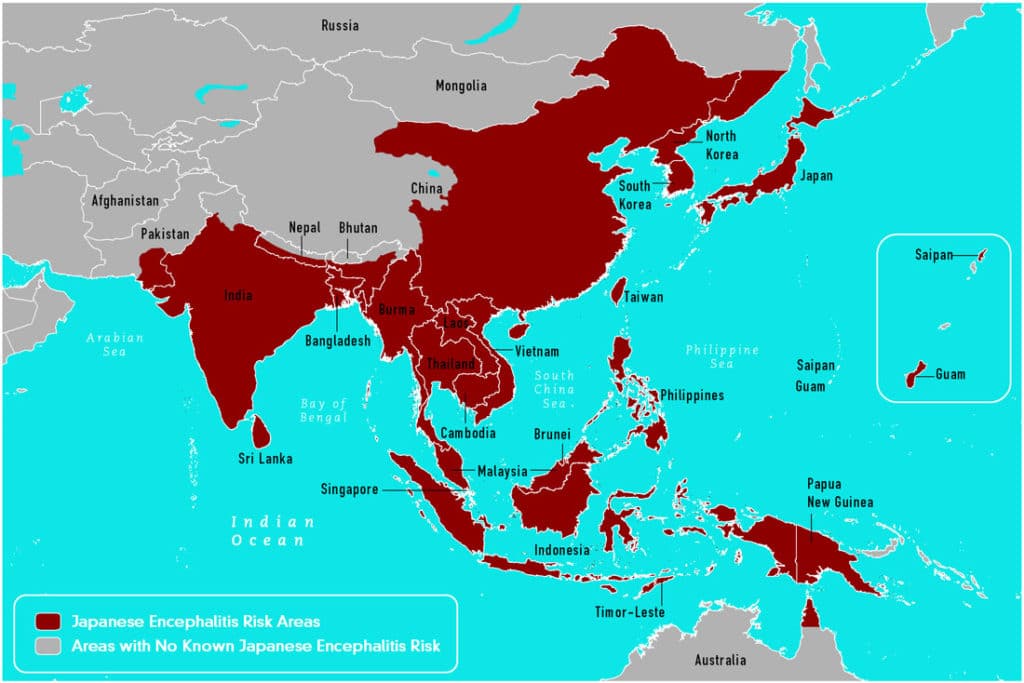JAPANESE ENCEPHALITIS – INFORMATION, ADVICE & VACCINATION

WHAT IS JAPANESE ENCEPHALITIS ?
Japanese encephalitis is disease transmitted through the bite of a contaminated mosquito. This infection can potentially be severe. The first symptoms usually appear 5 to 10 days after the infecting bite. They typically include a fever, headaches, vomiting, confusion and moving difficulties. In some cases, the victims of Japanese encephalitis develop more serious symptoms, such as swelling around the brain and coma, which can lead to death.
WHAT IS THE RISK FOR TRAVELERS ?
All the travelers going to Asia are at risk for Japanese encephalitis. The risk is generally low if they stay in urban areas, but it considerably increases if they go to rural zones, if they are frequently outside and if they travel for a long period. In Northern Asia, where the climate is mild, the risk is more important in summer and in fall. In tropical and subtropical areas, Japanese encephalitis occurs all year round.
HOW TO PREVENT JAPANESE ENCEPHALITIS ?
Vaccination
There is a vaccine against Japanese encephalitis. If you intend to travel to Asia, you should consider it. Consult a doctor at least six weeks before your departure, he will help you to decide if the vaccine is necessary for you, considering the length of your trip, the areas you will be visiting and the type of activities you will enjoy there. For optimal protection, two to three doses of vaccine must be administrated, with one month interval between each shot. You should get the last dose ten days before your departure.
Mosquito bite
In addition to the vaccine, you must protect yourself against mosquito bites while traveling.
- Wear protective clothes, such as long pants, long-sleeved shirts and hats.
- Apply mosquito repellent on exposed skin. Preferably choose a repellent offering long lasting protection and containing a high percentage of active ingredients, such as DEET and Picaridin. You can combine sunscreen and repellent, just apply the sunscreen first. Always follow product instructions and avoid applying repellent in your eyes, in your nose and on your hands.
- You can also use Permethrin-treated clothing and gear. Pre-treated items can be purchased in specialized shops, but you can also apply Permethrin on your own clothes and equipment, such as pants, socks, boots and tents. Always handle Permethrin with caution and avoid any direct contact with your skin. Permethrin provides optimal protection against mosquitoes, even after several washes.
- Always sleep under a mosquito net, especially if your room is exposed outdoors or if you sleep outside.
WHAT TO DO IF YOU ARE BITTEN BY A MOSQUITO ?
If you are bitten by a mosquito, avoid scratching the affected area and immediately apply hydrocortisone-based cream or calamine lotion to reduce the itch.
IF YOU FEEL SICK :
If you feel sick after traveling in Asia and you think that you may be infected with Japanese encephalitis, consult a doctor as soon as possible. Inform him/her of the areas you visited and of your activities there. Acetaminophen is often prescribed to reduce fever and pain. Do not use pain relievers containing aspirin and ibuprofen, as they may increase the tendency to bleed. It is also advised to rest and to drink a lot of water.
Are There Effective Treatments For Japanese Encephalitis?
No cure or particularly effective treatments have been identified for Japanese Encephalitis. There are, however, certain treatment protocols that have been suggested in order to help a patient’s body fight off the virus that causes this viral infection and to reduce the severity of the symptoms during the course of the infection.
In most cases, a patient diagnosed with this disease will be admitted to a hospital. While in hospital, they will be closely monitored in order to detect any signs of complications. Additionally, their fluid and oxygen levels will be kept at an optimal level through the use of different techniques. There are also some medications that can be given to a patient to help reduce fever, inflammation, pain and other symptoms associated with this infectious disease.
We make every effort to ensure that the information posted on our website is up to date and accurate according to the latest public health recommendations; however, it is impossible for us to make changes on a daily basis.
For the most current travel health recommendations, please call our clinic as make an appointment with one of our travel health professionals.
